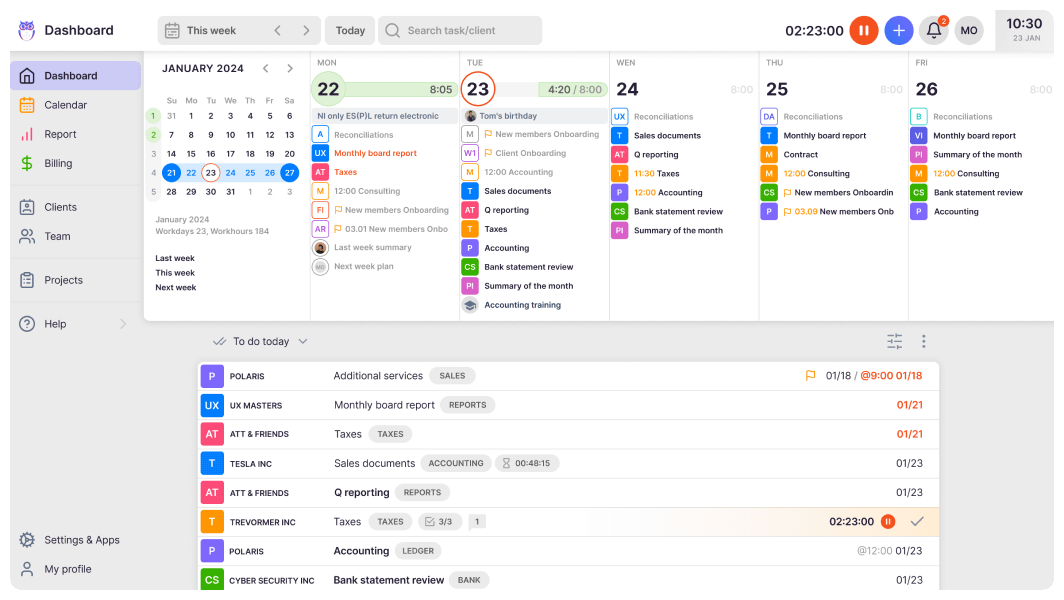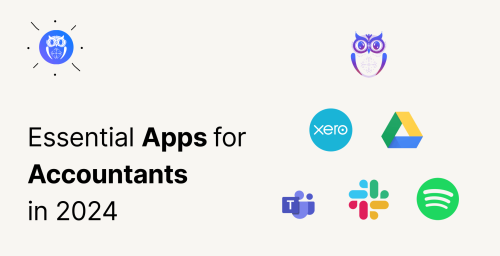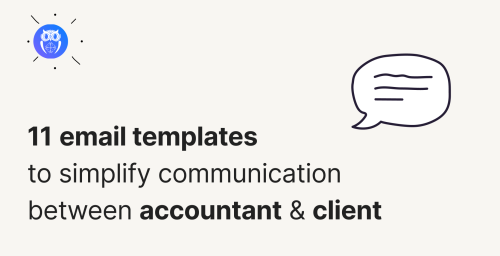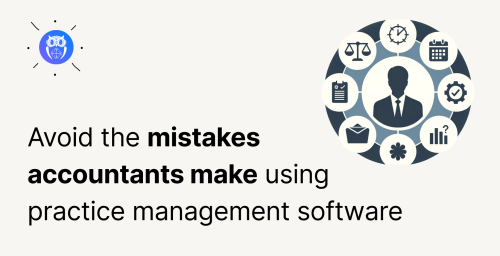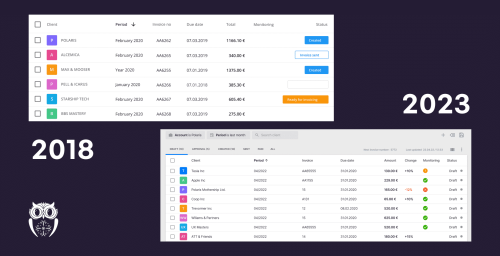Working from home? Great, stay there! We have created a must-have list of all the best tech tools for remote work to stay productive and collaborate with your team effortlessly from your home office.
Working from an office can be organisationally challenging, working from home, even more so.
How can you successfully maintain a cohesive accounting business?
Post summary:
- Stepping into remote work
- Accounting tech stack apps and services
Facing the reality of remote work
More of us have by now faced the reality of managing our own time and workloads. Along with balancing the conflicting attention needs of team productivity, immediate problem solving and business strategy.
Now we must also cope with the demands of family and going shopping for food while being on the phone with client after client trying to answer questions.
After all, stating that the life of a modern practice manager is a busy one would be an understatement. Whether you work for a company or own the practice outright, your workday interruptions come from many directions.
With the right tech-stack or tools for remote work to manage your practice, you can benefit from the current situation and keep your business operating.
But, with the technology ecosystem already so extensive and growing. It’s an arduous task to decide on which accounting tech stack to use.
How do you decide?
The best advice for modern-day remote work is to use a set of tried-and-tested apps and connected services that help you do your daily tasks. The aim is to stay organised and connected to your team and clients.
Likely, your clients have their favoured accounting software you’ll need to master. So this ‘list’ goes beyond that to provide accounting practice tools for productivity.
These tools can help you communicate and stay on task with clients, colleagues, friends, and family!
8 accounting tech tools to support remote work
#1. Communication: Slack
Slack is a cool messaging tool that divides your work between channels and direct messages. Plus, Slack can integrate with various other tools (Google Docs being an example) so streamlining workflows.
Slack is free, so a reliable small business tool but you can pay for an upgrade and get more features.
PRO tip: Use different Slack channels to maintain the “coffee corner” chats. It’s important that you maintain the same culture over the Web as it was in the office. Also Slack is perfect for solving problems. E.g create a channel #help and post your question there if you’re stuck somewhere. That way anyone can follow your question and brainstorm solutions together.
Win-win-win!
#2. Uku: Task management, CRM, Time-tracking, Efficiency analysis, entire workflow management
Here’s a list of tech tools for remote work you should adopt as an accountant.
Uku is cloud-based software giving accounting practice managers an all-in-one back-office tool that speeds up workflow management. Uku is designed as an alternative to the unhandy and impractical practice management software on the market.
Packed with features from time-tracking to assigning tasks with description and checklists between colleagues. Uku’s one-click approach means that remote working teams send, reassign and complete jobs even without the need to email or speak to each other. Every task has details of each worker’s input – thus radically speeding up task completion for clients.
With teams prioritising being at home with loved ones, doing tasks quicker is needed to maintain client satisfaction and completing accurate work.
#3. Scheduling: Calendly
Calendly is an easy-to-use scheduling tool. Calendly organises meetings with clients, schedules webinars and colleagues.
Calendly sends a calendar invite to any person you wish to schedule a meeting with. Recipients receive an email with multiple meeting slots, who in turn pick the slot that best matches their availability.
Once you and your invitee have agreed on a suitable time slot, you can add it to your calendar, whether iCal, Gmail or Outlook. Plus, any invitee you send invitations to does not have to sign up when choosing available slot times.
#4. Document Collaboration: Dropbox
Dropbox is unquestionably the most recognised brand name in cloud storage. It enables users to externally store files in the cloud that can then be either saved as storage items or shared with others who have access to the web.
All files sync across devices that Dropbox provides platform support for web, mobile and desktop. Dropbox stores and manages any file type available.
To get started with Dropbox on your computer, you download the application that creates a specific Dropbox folder on your computer.
Then you begin syncing files. Millions of internet users across the planet use Dropbox to store their files.
#5. Video Conferencing: Skype
Moving from face to face interaction to sitting in a room all day is disorientating. Thanks to video calling, you can at least interact with your colleagues.
There is a lot of video calling software on the market, from Google Hangouts, Zoom, Go To Meeting, Facetime (Mac users) and even Facebook.
One such tool we like using for video conferencing is Skype (we have to, it originates from Estonia, as do we!) We also love its screen sharing capabilities that can aid in file sharing and team building.
#6. Social Media Management: MeetEdgar
Whether you use social media or not, there is no escaping that it is part of our culture, and as a business, you must use it.
Most of us will schedule the odd post here and there, yet to be successful it’s best to post consistently. Where do you have the time and reminders to log in each day and post? Well, you can use a social media management platform like MeetEdgar.
With MeetEdgar, you schedule content into a queue all at once, reducing the time spent scheduling individual posts daily.
If you use core social media platforms of LinkedIn, Facebook and Twitter, then MeetEdgar is the tool for you to reach your audience and promote your practice online.
#7. Marketing: Convertkit
ConvertKit is email marketing software for professional businesses. Users create email sequences, can grow and segment their lists. Even better, much of the email marketing can be automated.
Newsletters or drip emails can filter various customer types so you can determine what type of future emails to send them. The more relevant, the more likely they will engage with your business.
#8. Integrations: Zapier
Most apps integrate with others already (think Google Suite and Slack). Yet for all others that do not integrate, then you can create an integration using Zapier.
It doesn’t sound very easy, but it is. Zapier syncs data between apps and platforms, even to several at once. For instance, if you receive a lead through your email campaigns, you can add them to your accounting software or Calendly to set up meetings.
# + Making Tax Digital for VAT
Okay, admittedly, this is hardly a new service to promote, yet love it or loathe it, HMRC is determined to make our tax reporting digital.
At Uku, we’re massive supporters of modern-day accounting and the digital accountants who work within the industry. With the COVID-19 pandemic driving us to work remotely (and subsequently digitally) practice managers should be familiar with the Making Tax Digital website.
If you’re working remotely, why not give one of these eight tech stack tools a go and determine how they will boost your remote workflow management?
Once you start using them, you may even find yourself remaining working remotely for good, even after the pandemic subsides!
Illustration: Icons8







